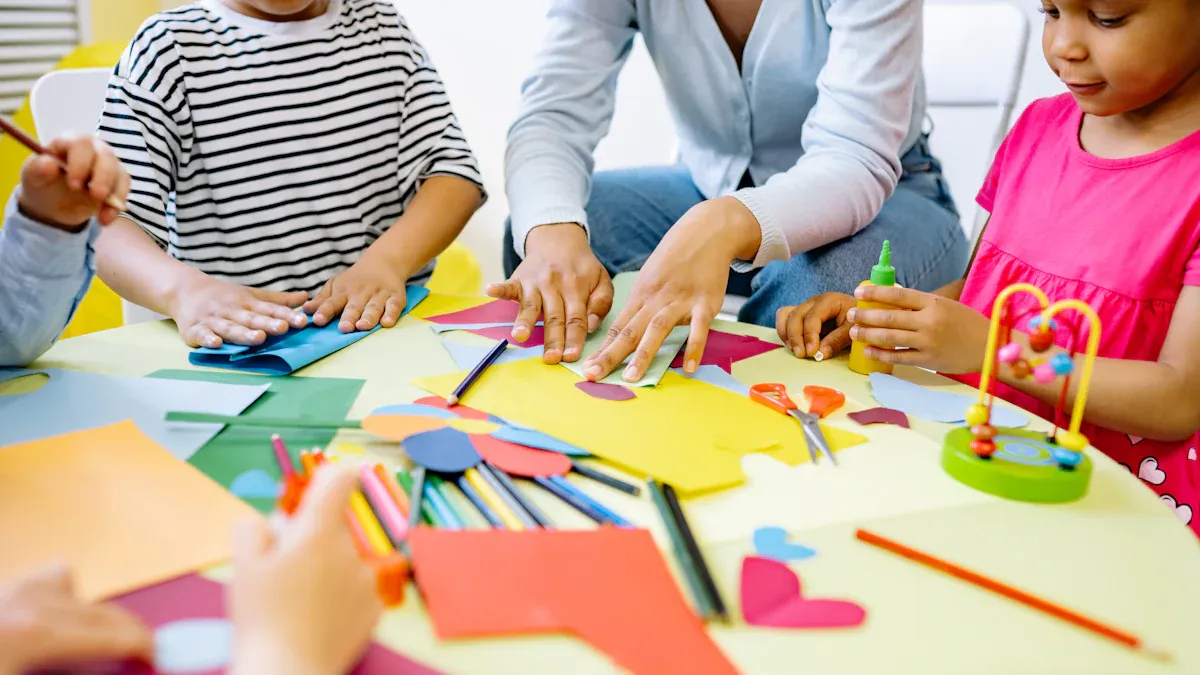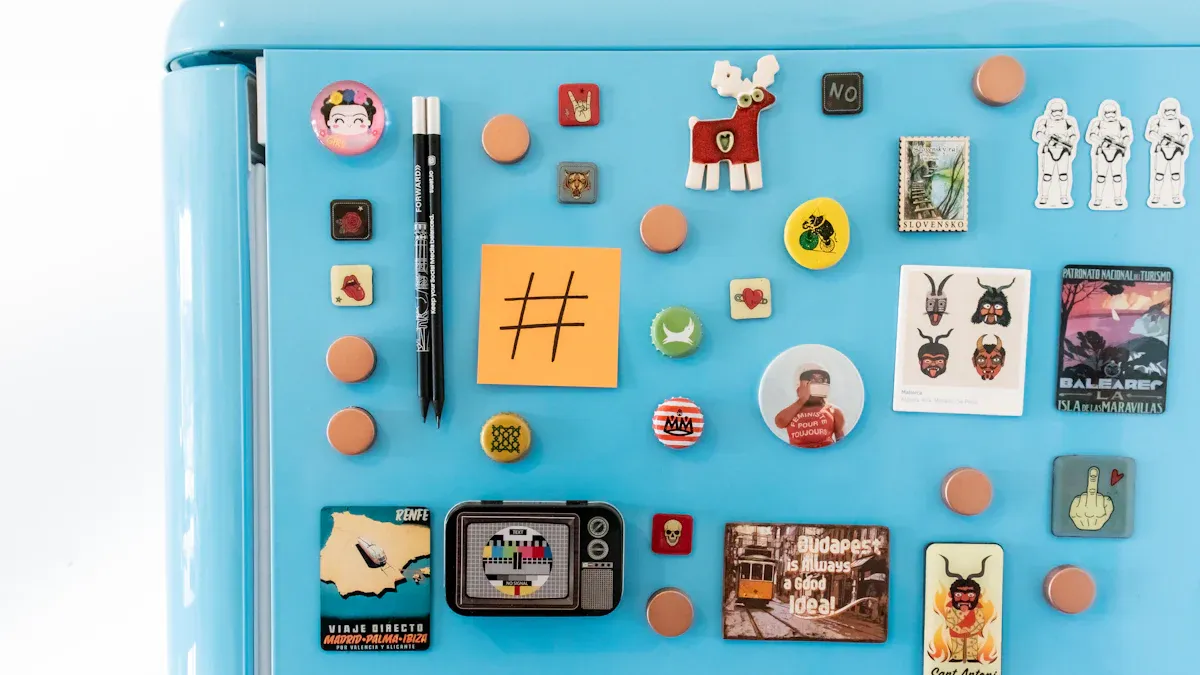You want your child to learn real-world skills and have fun. Busy boards teach kids to do both things. These boards use real-life objects for sensory play, helping kids improve fine motor skills. They also encourage children to start thinking like scientists. Busy boards teach in line with Montessori ideas, allowing children to explore and grow safely every day.

Key Takeaways
-
Busy boards help kids build fine motor skills with fun tasks like zipping and buttoning. Sensory play on busy boards lets kids explore and be creative. This makes learning fun and easy to remember. Pick safe and strong busy boards for your child. This helps them play without worry.
Skills Busy Boards Teach

Fine Motor Skills for Children
You want your child to feel sure doing daily tasks. Busy boards help kids learn fine motor skills through play. Kids turn gears, slide beads, and stack pegs. These actions make their fingers stronger and more coordinated. This helps them get ready for writing, drawing, and dressing.
-
Busy boards and pegboards make kids use their fingers in new ways.
-
Stacking pegs and making shapes help with finger control.
-
Turning knobs and switches helps kids focus and move their hands better.
-
Using fingers on busy boards builds hand strength and control.
Busy boards are different from playdough sets or pegboards. They mix sensory play, color, and thinking skills. You see your child focus, use both hands, and solve problems while playing. This kind of play helps kids grow and learn. It also helps their brains get stronger.
Sensory Play and Exploration
Sensory play is important for busy boards. Your child feels soft fabric, bumpy rubber, and smooth metal. They hear bells, rattles, and crinkly paper. They see bright colors, mirrors, and glitter tubes. Every part of a busy board gives a new way to explore.
|
Examples |
Developmental Significance |
|
|---|---|---|
|
Textures |
Soft fabric, bumpy rubber, scratchy sandpaper, smooth metal, squishy foam |
Helps with motor skills and sensory learning |
|
Visuals |
Mirrors, colorful LED lights, translucent panels, floating glitter tubes |
Sparks creativity and curiosity about materials |
|
Sounds |
Crinkly paper, jingle bells, rattles, rain sticks |
Supports sensory learning and language skills |
|
Movement |
Wheels, gears, sliding panels |
Helps fine motor skills and exploring |
Occupational therapists say repeating actions like turning gears or sliding beads helps kids calm down. You can use busy boards at home or school. They are good for sensory play anywhere. If your child has sensory needs, busy boards help them get used to new feelings and learn to process them.

Everyday Life Skills
Busy boards teach real-life skills with real objects. You see your child zip, button, and latch by themselves. These skills help with things like getting dressed or opening doors. Busy boards help kids learn to solve problems and think clearly.
-
When your child uses the zipper on the board, show them the zipper on their jacket.
-
After they learn latches, you can show them cabinet latches with help.
-
Light switch practice on the board helps with real switches at home.
-
Turning knobs on the board helps with doorknobs in the house.
Busy boards help kids learn to solve problems. They find out how things work and see what happens when they try something. Latches and locks make them practice opening and closing, which helps their hands and thinking skills.
Popular busy board features give more benefits:
|
Developmental Benefit |
|
|---|---|
|
Zippers |
Builds fine motor skills and helps kids be independent. |
|
Switches |
Helps with hand control and learning cause and effect. |
|
Buttons |
Makes fingers stronger and teaches cause and effect. |
|
Gears |
Helps with problem-solving and learning about movement. |
|
Latches |
Builds problem-solving and hand control. |
|
Mirrors |
Gives visual fun and helps kids see themselves. |
|
Locks and Keys |
Improves hand-eye coordination and focus. |
|
Tactile Surfaces |
Gives sensory play, good for kids with sensory needs. |
Busy boards also help kids think like scientists. They try ideas, watch what happens, and sort things. Simple experiments and cause-and-effect play help kids learn science skills.
Tip: Let your child play with the busy board for 20 to 30 minutes. Toddlers often come back to it during the day and try new things each time. Doing this again and again helps them learn and get better at skills.
Busy boards help kids learn real-world skills in a safe way. They follow Montessori ideas. You give your child a chance to explore, learn, and grow with confidence.
Montessori Busy Board and Safety

Safe Design for Children
When you pick a montessori busy board, you want it safe. Safety is very important for young kids who like to explore. Montessori ideas help make sure the board is right for little kids. You will see strong boards with features for their age. These boards use real things, but safety always comes first.
You may ask what makes a montessori busy board safe. Here are things to check:
-
Non-toxic materials, like lead-free paint and BPA-free plastics, keep your child safe from bad chemicals.
-
Strong hardwood, like birch or maple, does not splinter and can handle rough play.
-
Stainless steel latches and hinges are better than cheap metals that might break or rust.
-
Water-based paints and food-safe finishes make surfaces safe for small hands.
-
Organic cotton and felt give soft textures without harsh dyes.
-
All pieces stay attached, so nothing falls off during play.
-
No tiny parts that could be a choking risk, following CPSC rules.
-
Non-toxic wood glue and screws keep the board together.
Montessori learning wants a safe place for kids to learn. You want your child to touch and play without worry. Check the board often for damage or loose parts to keep it safe. You help your child feel safe as they learn and become more independent.
Tip: Always look over your montessori busy board for loose or broken parts before your child plays. A quick check keeps play safe and fun.
Supervised and Independent Play
Montessori busy boards help kids play on their own and learn. You watch your child try new things and solve problems by themselves. These boards let your child pick what to do and explore in their own way. You see your child feel proud when they learn new skills.
Montessori busy boards are good for both watching and solo play. You can sit close and see your child figure things out. You can also let your child play alone, knowing the board is safe. This lets your child learn freely while you feel calm.

Here is how montessori busy boards help kids learn and grow:
|
Benefit |
How It Helps Your Child |
|---|---|
|
Your child learns to do things by themselves. |
|
|
Boosts self-esteem |
Doing tasks well makes your child feel proud. |
|
Improves concentration |
Your child pays attention longer to activities. |
|
Follows montessori education |
Lets your child choose and learn on their own. |
|
Supports sensory exploration |
Your child can touch, see, and hear new things. |
Montessori busy boards give kids a safe place to explore and use real objects. You help your child learn by playing, building skills for life. You let them be independent but always keep safety first.
Why Busy Boards Teach Effectively
Real-World Learning
You want your child to learn real skills in a fun way. Busy boards use things like zippers, switches, and latches from daily life. These are not like regular toys. Montessori busy boards help kids stay interested and learn better.
|
Type of Toy |
Engagement Time |
Learning Improvement |
|---|---|---|
|
Increased |
Higher |
|
|
Traditional Toys |
Lower |
Lower |
Montessori busy boards let kids touch, see, and hear new things. This helps them remember what they learn. Kids try new things, fix mistakes, and keep going. They learn by doing, not just by watching. Kids get quick feedback, so they learn faster and feel good.
Note: Multi-sensory play helps kids understand and remember more. You give your child a safe place to try and learn.
Benefits for Children
Montessori busy boards have many good effects. They help kids get better at using their hands and eyes together. Kids also learn to solve problems and think in new ways. Busy boards teach kids to try, change, and keep working. This helps them learn and not give up.
-
Fine motor control: Kids learn to button shirts and use forks.
-
Controlled practice: Busy boards give a safe place to practice.
-
Cognitive development: Kids solve problems and learn cause-and-effect.
-
Sensory exploration: Kids learn with textures, sounds, and colors.
-
Independence: Kids feel proud when they do things alone.
|
Description |
|
|---|---|
|
Kids get better at dressing and using utensils. |
|
|
Cognitive Skills |
Kids learn to solve problems and think logically. |
|
Sensory Exploration |
Kids get curious by touching and hearing new things. |
|
Independence |
Kids learn to do things by themselves and feel confident. |
Montessori busy boards make learning safe and fun. You help your child grow and learn every day. Busy boards teach real skills and help kids feel brave to try new things.
You want your child to have fun while learning real skills. Busy boards give children safe ways to explore, play, and grow.
-
Experts say busy boards help toddlers build fine motor skills and language.
-
Choose boards with safe materials and secure parts for worry-free fun.
Busy boards make learning fun, practical, and safe for every child.
FAQ
What age is best for busy boards?
You can introduce busy boards to your child as early as 10 months. Most kids enjoy them up to age 4. Always check for age-appropriate features.
How do I clean a busy board?
Wipe the board with a damp cloth. Use mild soap for sticky spots. Avoid soaking wooden parts. Let everything dry before your child plays again.
Can busy boards help with sensory issues?
Yes! Busy boards give your child safe ways to explore textures, sounds, and movement. Many therapists recommend them for sensory development and calming play.









